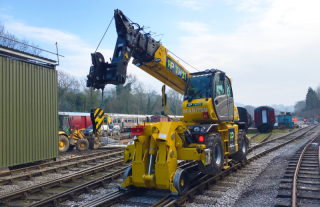Rail plant operators want an industry-wide review to help make their sector financially viable.
The call is made in a paper written by the Rail Plant Association (RPA), which says: “Rail plant is at the heart of maintaining the rail infrastructure in the UK – yet there are doubts around its long-term viability due to the economic uncertainty for those companies operating this specialist equipment.”
As a result of the current downturn in work, companies are losing trained frontline staff. Companies lack the confidence needed to invest in new machinery and equipment and to turn research and development (R&D) programmes into technologies.
The challenge for owners of the expensive highly-specialist machinery is that workloads are cyclical but the equipment cannot be put to work on other types of projects when rail demand is down.
The RPA’s paper, called The UK rail plant industry in 2019 – coming off the tracks?, floats the idea of pooling resources to cope with this, but does not make clear how this might work.
Research carried out by the RPA suggests that its members are working at 70% of workload capacity during the week, and at just 60% at weekends. Although such utilisations rates might be considered adequate for some types of plant, the RPA says that this level is unsustainable for its members and damage to the rail maintenance supply chain may take many years to repair.

It is not just the plant that is specialist; so is the workforce. While headcount can be cut immediately if circumstances demand, when workloads improve up it is much harder to staff up. It can take two years for a plant operator from a traditional construction background to learn the skills needed to operate a road-rail excavator, the RPA says That cost and experience is lost once they leave the industry – especially as the financial incentives are currently higher in civil engineering and construction.
RPA members want a ‘Williams style’ review for the rail infrastructure industry, concentrating on efficiency, work patterns and the commissioning process. “It should consider where the industry is failing – and why – and provide workable, practical solutions that both the industry and the government buy into and commit to,” the RPA says.
The actual Williams review only investigates the transport operating structures of the rail industry.
The RPA’s paper also calls for greater freedom for plant suppliers to offer innovation and do things differently.
It says: “A culture change is needed to overcome the inflexible, rules-based compliance model with suppliers given greater freedom in meeting outcomes. Regulation and compliance are vital to the safe operation and maintenance of a system as complex as the rail network, however companies are forced to follow an inflexible, rules-based culture of compliance that does not allow for innovation, is often inefficient and adds unnecessary cost and delay to work. An honest discussion is needed with Network Rail and the government in identifying where this culture of inflexibility around compliance is having an adverse impact on rail plant operators and is adding to the economic burden.”
- The UK rail plant industry in 2019 – coming off the tracks? can be downloaded from the CPA website.
Got a story? Email news@theconstructionindex.co.uk



